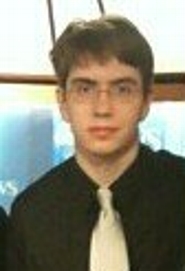
Niels Lesniewski '07 (Stonington, Conn.) grew up hearing his grandparents tell stories about the hurricane which, in 1938, destroyed New England. When Hurricane Katrina made landfall in August 2005, Lesniewski thought of the stories he'd been told; "part of me was thinking, that could very well be my hometown too."
Now, almost a year later, Lesniewski, a government/theatre major, takes another look at Katrina and her aftermath, this time from the point of view of a government student. He asks, not "what went right and what went wrong," but what this says about the way in which Congress deals with a situation where the humanitarian response is lacking. With his advisor Frank Anechiarico, Maynard-Knox Professor of Government and Law, Lesniewski has a Levitt Fellowship to do research for an investigation titled "The Government's Response to Hurricanes: Lessons less than Learned?"
After storms like Katrina, the situation is often one where people go to the government for aid and blame the government for problems. Lesniewski is interested in finding out whether these critics of the Federal government – those who claim that the Congress always makes the same mistakes – are justified, or whether there is a slow improvement occurring; whether the lifespan of an event is too short to effect changes or whether federal hurricane response is "a process which gets slowly and surely better over time."
In order to examine change over time, Lesniewski proposes to study the reactions to other recent storms. He will be focusing on popular and governmental responses to Hurricane Andrew, which hit Florida in 1992; Hurricane Hugo, which hit South Carolina in 1989; and Hurricane Camille, which ran along the Gulf Coast in 1969. Based in Connecticut for the summer, Lesniewski is spending most of his time inside government depository libraries. In addition to reading a "multitude" of congressional transcripts, he is planning to interview people involved with the hearings after the three storms (representatives of FEMA, the people in Homestead, Fla., responsible for domestic preparation, and congressional activists associated with the legislation passed after each storm).
This research will develop into a senior Government thesis for Lesniewski, who plans to use the three above storms, as well as Hurricane Katrina, as his examples. He concludes that "this [how the government deals with hurricane results] is an issue getting a lot of media attention" but that no one is taking a close look at solutions or ways to fix things. It "generates a real visceral reaction when you see pictures on TV, but I don't think people comprehend what's going on [at a governmental level]."
Lesniewski is a busy Hamiltonian; on the Hill he is heavily involved with the theatre side of his major. He also runs a radio show on WHCL and works as an RA; in spring 2006 he participated in Hamilton's Washington program where he interned with ABC News. Lesniewski is no stranger to summer research; he spent last summer working with the Utica HOPE VI Project. He hopes to continue this summer's research and, in the future, to work in political journalism or attend graduate school in public administration.
The grant which funds his work is the Levitt Research Fellowship, funded by the Arthur Levitt Public Affairs Center. It is intended to fund research into a public affairs issue and allows a student to spend 10 weeks working closely with a faculty advisor.
-- Lisbeth Redfield
Posted July 5, 2006
